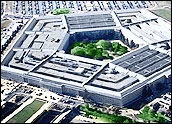
Google’s Street View, a mapping feature that has caught flak over privacy issues in the past, apparently has crossed forbidden security boundaries.
The Pentagon has banned Google street mapping teams from taking photographs inside military bases after street images from inside Fort Sam Houston in Texas were posted on the Web site. Google removed the images at the U.S. military’s request, company spokesperson Larry Yu told TechNewsWorld.
“Our policy is to not ask for access to military installations,” Yu said. “Imagery is captured by a camera on top of a car on public roads, and that’s our general policy.”
A Misunderstanding?
In this instance, the crew — in the process of capturing images around San Antonio, where the base is located — asked for permission to enter the base, Yu noted.
“They were granted permission, and they went onto the property and captured the imagery,” he said. “Perhaps it was a misunderstanding. I think it was a lack of clarity between the driver and whoever gave permission. I think it clearly was error on both sides.”
It’s not the first time Google Street View, an offshoot of Google Maps, has found itself mixed up in controversy since its launch last May. Street View, which provides 360-degree panoramic views of selected cities at ground level, has been linked to reports of images capturing people in compromising situations, including women sunbathing, men entering strip clubs, and even motorists being ticketed.
Google is sensitive to privacy concerns of individuals and has removed images at the request of private parties, Yu commented. “There are varying thresholds of what privacy is, and we respect that.”
Street View, which enables a user to take a virtual tour of an unfamiliar neighborhood and turn by maneuvering a mouse, was launched in only about a half-dozen cities, but has expanded to include 30 now. The service has drawn praise as a tool in helping users find everything from a residence to the nearest gas station.
In this case, the U.S. Department of Defense said images of the base had compromised its security, according to reports.
The Department of Defense did not return a telephone call for comment.
A Bit Late to Be Worried
It’s a bit late to be concerned about Google mapping and imagery, said Alan Chapell, president of Chapell and Associates, which focuses on search engines.
“Isn’t the horse pretty much out of the barn on this?” Chapell told TechNewsWorld. “I understand the military’s need to keep secrets, but if Google can do it, that probably means somebody else can do it. If the strategy is that by preventing Google or Yahoo or the like from doing it that other countries aren’t going to be able to do it, I don’t know if that’s the right strategy.”
Times have changed — and left behind strategies like that, Chapell said. “It worked in the 1950s, with nuclear proliferation, when, I suppose we thought the Soviets would take 50 years to develop nuclear bombs, and what did it take? 10?
“Something like this may make some people feel safer, but I don’t know if that would create any additional safety.”
U.S. Air Force Gen. Gene Renuart, chief of the U.S. Northern Command, was quoted as saying Thursday that the images of the base showed the location of guards, details about barrier operation and building portals.
“It makes sense to me,” Roger Kay principal analyst for Endpoint Technologies, told TechNewsWorld. “It’s a really useful tool, and I’ve used it myself, but you can imagine what happens if the bad guys get ahold of very, very good information, with respect to military targets.”
Two-Way Tool?
Apparently, it works the other way, as well. Last summer, satellite imagery on Google Earth gave the public a view of a new Chinese submarine.
“I’ve taken some NASA imagery and looked at Iraq, for example, and have seen incredible military stuff,” Kay said. “You can see trench lines. You take higher-resolution photographs, and you can see quite a lot. They just didn’t have this stuff 60 years ago. The level of information available to the public is much better than what was available even to the military in World War II.”
Both Chapell and Kay agreed that Google was probably prudent to accede to military requests to keep off the military bases.
“I don’t think that was the place where you, as an organization, should think about standing your ground,” Chapell said. “When the government starts looking for individual ISPs (Internet service providers) or things like that, that’s where you stand your ground.”




















































